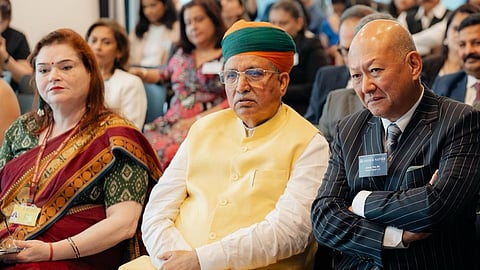
- Latest Legal News
- News
- Dealstreet
- Viewpoint
- Columns
- Interviews
- Law School
- Legal Jobs
- हिंदी
- ಕನ್ನಡ

The India International Arbitration Centre (IIAC) recently organised a special session during Singapore Convention Week 2025 on the theme ‘Selection of Arbitrators in an India-Related Dispute.’
Hosted by Drew & Napier, the session underscored both countries’ pivotal role in shaping the future of global dispute resolution.
Addressing the gathering, Arjun Ram Meghwal, Union Minister of Law and Justice, Government of India, highlighted arbitration’s deep historical roots in India, referencing to lord Krishna as the first mediator and arbitrator in Indian tradition.
He traced the evolution of arbitration in India from traditional mediation practices to the Arbitration Act of 1940 and the Arbitration and Conciliation Act, 1996.
The Minister reaffirmed India’s commitment to becoming a global arbitration hub saying,
"Our reforms aim to create a transparent, efficient, and world-class arbitration ecosystem. Singapore is a valued partner in this journey.”
Jimmy Yim, Chairman of Drew & Napier LLC, highlighted India’s historic and continuing influence in Asia and beyond, while noting Singapore’s strong economic and legal ties with India. He observed that between 2020–2024, the Singapore International Arbitration Centre (SIAC) emerged as Asia’s leading arbitration hub and second globally, with Indian law frequently chosen as the governing law in disputes. Yim stressed that arbitrator appointments are central to this growing cooperation and welcomed the dialogue as a platform to deepen India–Singapore collaboration in arbitration.
Shilpak Ambule, India’s High Commissioner to Singapore, placed the discussions in the broader context of bilateral relations, citing robust trade, investment, and state-level ties.
“Singaporean companies are expanding rapidly in India, while Indian firms are deepening their presence in Singapore. Cooperation in arbitration adds an important layer to this strategic partnership,” he remarked.
Anju Rathi Rana, Law Secretary, Government of India, stressed the need for stronger institutional frameworks and capacity-building in arbitration.
“Cross-border commerce requires efficiency and trust. India’s arbitration institutions are steadily building the expertise to deliver both,” she observed.
A panel on the topic 'Selection of Arbitrators in India-Related Disputes', moderated by Drew & Napier director Abhinav Bhushan, focused on the need to diversify beyond retired judges.
During the panel discussion, Justice Hemant Gupta highlighted that while retired judges are readily available for arbitration, effective arbitration often needs a different approach.
“To be a good arbitrator, a judge has to unlearn certain judicial habits,” Justice Gupt said.
He added that with 70% advocates on their panels, IIAC can help dispel the myth that only retired judges should be appointed
On international perceptions of India-related arbitrations, Justice Gupta remarked that institutions must earn user confidence through consistent performance.
“Our performance will bring reputation,” he said, pointing to the benefits of a pan-India institutional presence.
Dr. Pinky Anand called for appointments based on merit and diversity, noting that arbitration should evolve into a full-time professional practice rather than a “part-time business,” while encouraging the entry of young lawyers into the field.
Echoing the sentiment, Nitesh Jain advocated for a more diverse arbitrator pool that includes trained lawyers and professionals exposed to international best practices.
Sanjeev Gemawat identified India’s reliance on ad hoc arbitration as a key challenge, noting that it has reinforced the culture of appointing retired judges. He stressed the need for arbitrators with commercial and contractual expertise and highlighted industry preference for English law-trained professionals.
Mahesh Rai noted that while arbitration in India was long seen as a domestic affair, challenges emerge when disputes move to the international stage. He observed that parties often avoid Indian seats for cross-border disputes, preferring Singapore and other recognised centres for their professionalised arbitration systems. Rai highlighted the perception issue surrounding appointments, where international practice emphasises professional arbitrators rather than exclusively retired judges. He stressed that India must address these concerns to build confidence in Indian arbitrators on the global stage.
The event closed with a vote of thanks from Ganesh Chandru.